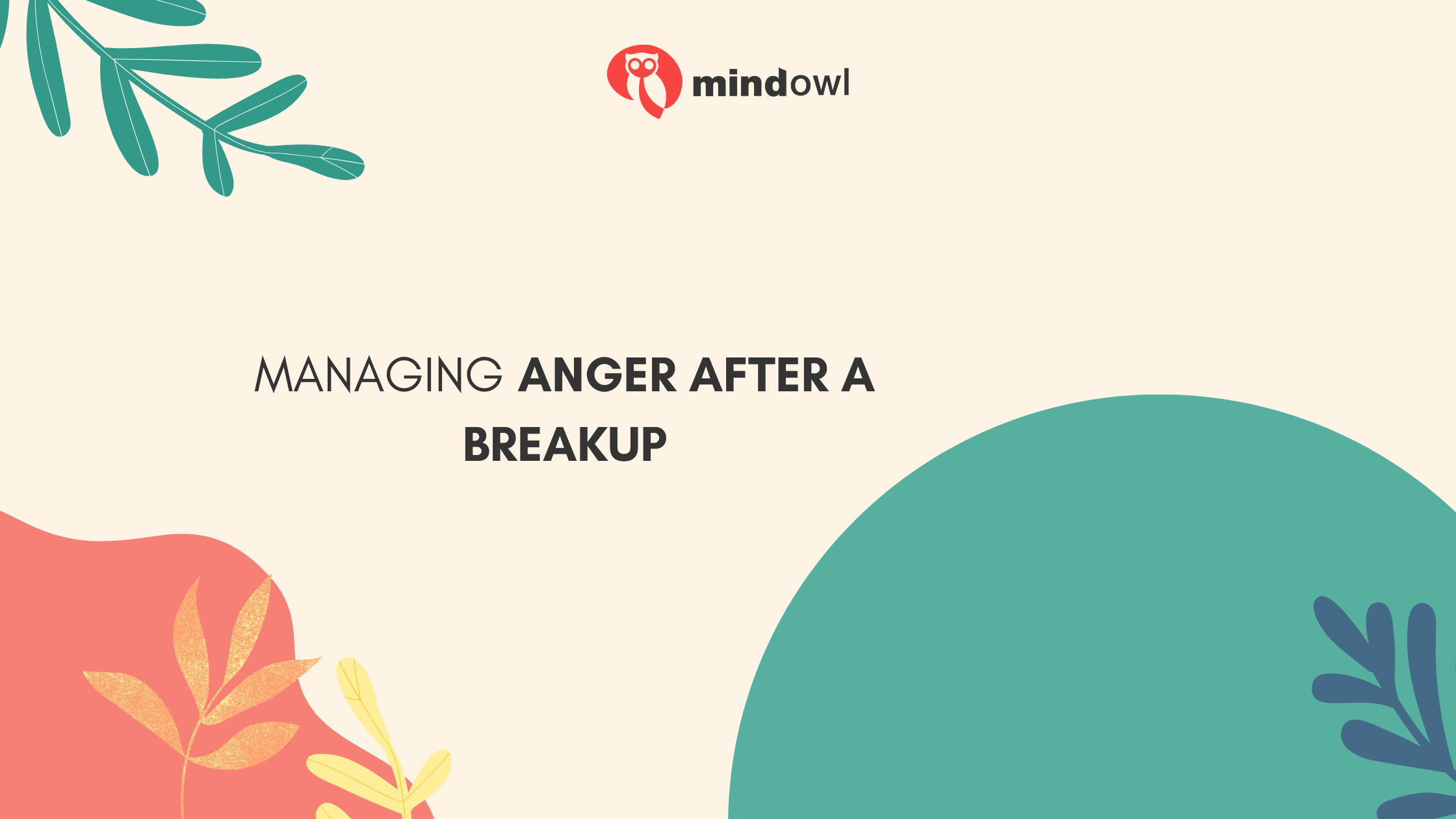Breaking up is tough, and managing the anger that follows can pose a real struggle. An avalanche of emotions like denial, anger, bargaining, depression, and acceptance commonly hit many individuals post-breakup.
This article offers practical strategies to handle the feeling of anger by acknowledging it healthily rather than suppressing it to pave the way for healing and moving forward.
Dive into this guide; you’re one step closer to conquering your emotional aftermath!
Key Takeaways
- After a breakup, it is common to experience stages of denial, anger, bargaining, depression, and acceptance. These stages may occur in different orders for different people.
- Three types of anger can arise after a breakup: displaced anger (directing anger towards others), passive-aggressive anger (expressing anger indirectly), and redirected anger (taking out anger on unrelated things or people).
- To manage anger after a breakup, it is important to be aware of your feelings, identify the type of anger you are experiencing, choose healthy ways to express it (like journaling or talking to someone), address the root cause of your emotions through therapy if needed, and develop a positive outlook by focusing on personal growth and self-care.
- Seeking support from friends, family, or professionals is crucial for healing after a breakup. Writing about the positive aspects of the relationship’s end can also help build empowerment and reduce negative emotions. Engaging in physical activities can also be a helpful way to deal with your anger.

The 5 (Potential) Stages of a Breakup, According to Relationship Experts
Relationship experts have identified five potential stages of a breakup, including denial, anger, bargaining, depression, and acceptance.
Denial
Denial is a stage many go through after a breakup – a shock that helps slow the sadness. People use denial as a shield to hide from hard feelings, saying things like “This can’t be true” or “I don’t believe it happened.” These words show denial about the relationship’s end.
There is no set order for when this stage will happen in the healing journey. Everyone goes through grief differently and at different times after a breakup.
Anger
The second stage is often anger, as the heartbreak sets in. You might blame your ex or even yourself for the relationship’s failure. Anger can take different forms and intensities – some express it openly, while others hide it deep inside.
Both ways are common but can cause problems if not handled healthily. Facing this anger stage head-on is key to overcoming the post-breakup grief.
Bargaining
Bargaining is common when dealing with heartbreak after the anger stage. People try to make deals or changes to fix things, thinking about how they can change the end. This is their way to feel control over the upsetting situation.
Bargaining helps cope with the hard feelings from a breakup. Each person may not follow these stages in order, and bargaining could happen at different times.
Depression
Depression is a common experience after a breakup, diagnosed as an adjustment disorder with depressed mood – the end triggered sadness and despair. Experiencing depressive symptoms is normal and part of grieving. However, seek support if symptoms persist or worsen over time. Therapy or counselling can help cope with grief and navigate feelings of depression triggered by the emotional end.
Acceptance
Acceptance is crucial for healing and moving forward after a breakup. Relationship experts agree accepting the end is an important step in the healing process and finding closure.
Therapists see individuals go through denial, anger, bargaining, depression, and eventually acceptance when dealing with a breakup. Acceptance means acknowledging the relationship ended and coming to terms with it gradually.
The Three Types of Anger After a Breakup
After a breakup, individuals may experience three types of anger: displaced anger, passive-aggressive anger, and redirected anger.
Displaced anger
Displaced anger is when someone takes out their frustration or rage on someone or something other than the actual cause. It can manifest externally, where they act openly angry towards an innocent party. This perpetuates negativity and starts a cycle of fights.
Understanding the reasons behind displaced anger, such as childhood trauma or unresolved issues, can help in dealing with it effectively. By addressing the root causes and finding healthy ways to express emotions, we can break free from this destructive pattern after a breakup.
Passive-aggressive anger
Passive-aggressive anger happens when someone feels angry but doesn’t express it directly after a breakup. Instead, they may act in indirect, dishonest ways. This complicated behaviour often stems from hostility and anger surrounding the breakup, causing indirect responses instead of open expressions.
Recognizing passive-aggressive tendencies and their underlying emotions is important for processing anger constructively and promoting healing after a painful breakup experience.
Redirected anger
Redirected anger occurs when you feel angry and upset after a breakup, but instead of dealing with those feelings directly, you take them out on other people or unrelated things. The breakup pain feels overwhelming, making it easier to direct anger elsewhere.
However, redirected anger can negatively impact mental and emotional well-being. Recognizing this type of anger and finding healthy coping mechanisms, like therapy, is crucial for processing emotions constructively to heal and move forward.

Strategies for Dealing with Anger After a Breakup
Here are some strategies for dealing with anger after a relationship breakup:
Be aware of your feelings
It’s important to be aware of your feelings after a breakup. Recognizing and acknowledging your emotions, whether anger, sadness, or resentment, can help you process them better. Don’t try to suppress or ignore what you’re feeling. Instead, give yourself permission to experience your emotions fully. This self-awareness will help you understand the impact the breakup has had on you and allow you to take steps towards healing and moving forward. Allowing yourself to feel is a normal part of the healing process.
Identify the type of anger
There are three types of anger that can arise after a breakup – displaced anger directed at unrelated targets, passive-aggressive anger expressed indirectly and redirected anger where you blame yourself. Identifying which type of anger you’re experiencing is important to find healthy ways to cope with it and move forward.
Understanding the specific form your anger takes can provide insight into its root causes and guide you towards constructive outlets to process those emotions effectively.
Choose a healthy way to express it
Expressing anger in a healthy way is vital after a breakup as it allows you to release pent-up emotions and find liberation. Journaling feelings, physical activities like exercise or yoga, talking to trusted friends or a therapist, and relaxation techniques like deep breathing or meditation are all constructive ways to express anger healthily.
These methods can help you process emotions effectively and avoid letting anger consume you. Seeking therapy or counselling can also provide valuable guidance and support during this challenging time of expressing anger constructively.
Work on the root cause
To effectively manage anger after a breakup, it’s important to work on addressing the root cause of your emotions. Take time to reflect and understand why you are feeling angry – it could relate to unresolved relationship issues or deep insecurities. By identifying these underlying factors, you can begin to heal and move forward. Consider seeking professional help like therapy or counselling, which can provide guidance in exploring and resolving these emotional wounds. Healing takes time, so be patient with yourself.
Develop a positive outlook
Developing a positive outlook is crucial when dealing with anger after a breakup. It involves shifting focus towards the future and finding hope in new beginnings, rather than dwelling on negative emotions. Remind yourself you have the power to create a happier, healthier life.
Surround yourself with supportive people who encourage positive thinking. Engaging in joyful activities and self-care can also cultivate an optimistic mindset. With a positive outlook, you can better navigate healing’s challenges and find renewed happiness.
Talk it out
Talking about your feelings and experiences after a breakup is important for healing and moving forward. Sharing with trusted individuals like friends or family provides support and comfort. Expressing emotions out loud helps process them better and gain new perspectives.
Seeking professional guidance from therapists or counsellors specializing in breakups can also offer valuable insights, techniques and strategies to navigate the anger and pain. Remember seeking support is a step towards healing, not weakness.
Practice mindfulness
Practising mindfulness is an important strategy for dealing with anger after a breakup. Mindfulness means being fully present and accepting feelings without judgment. It helps you become aware of emotions, thoughts and bodily anger sensations, allowing observation without getting consumed.
By staying present and mindful, you gain a better understanding of anger triggers and can choose healthier responses. Mindful meditation is also beneficial, calming the mind and body to reduce anger. Integrating mindfulness into your routine aids healing and promotes positive coping.
Overcoming Anger After a Breakup
In this section, we’ll explore different ways of overcoming anger after a breakup, including realizations about self-esteem, accepting responsibility, and discovering healthy ways to channel their anger.
Realizations about self-esteem:
Having low self-esteem can greatly impact how we handle anger after a breakup. Our feelings of anger may stem from a lack of confidence and a negative self-image. By recognizing these underlying factors, we can start working towards rebuilding our self-esteem through practices like self-love, self-care activities, and reflecting on our strengths.
Through counseling or therapy, we can also address any deep-seated issues affecting our self-esteem and learn healthier ways to cope with anger during the healing process after a breakup. Improving self-esteem is key to managing intense emotions like anger in a constructive manner.
Accepting responsibility
Accepting responsibility is a crucial step in managing anger after a breakup. It means acknowledging your role in the relationship’s end and taking ownership of your emotions and actions. By accepting responsibility, you can begin to heal and move forward by taking charge of your own happiness and making necessary changes.
Letting go of past grievances, even without receiving an apology, can aid in the healing process. Being honest with yourself about the reasons for the breakup is also important. Therapy techniques can assist individuals in letting go of past relationship trauma and finding healthier ways to handle their anger.
The Importance of Acceptance and Expression
Acceptance and expression play a crucial role in anger management after a breakup. It’s important to acknowledge and accept the negative emotions that come with the end of a relationship. Acceptance is also key in moving forward after a breakup. Accepting that the relationship has ended and that it’s okay to feel upset or angry can help us let go of resentment. Acceptance doesn’t mean minimizing or invalidating our pain but rather acknowledging it while also being open to new possibilities. It allows us to focus on healing and finding happiness again.
Instead of suppressing or ignoring these feelings, it is healthier to express them constructively through outlets like talking to friends or writing in a journal. Expressing our emotions allows us to process and healthily release anger.
Combining acceptance with healthy expression can lead to personal growth and emotional well-being post-breakup. Through acceptance and expression, we give ourselves permission to heal and move forward towards better days ahead.
Healthy ways to channel anger
One healthy way to channel anger after a breakup is through physical activity like going for a run, hitting the gym, or any form of exercise to release pent-up frustration and stress. It also releases mood-boosting endorphins. Another effective method is journaling or writing down thoughts and feelings to express anger in a safe space without hurting others.
Additionally, seeking support from friends, family, or a therapist can provide an outlet for sharing emotions and receiving guidance on healthier ways to cope with anger after a breakup. Finding constructive outlets is crucial for processing anger in a productive manner.
Conclusion
In conclusion, managing anger after a breakup is crucial for healing and moving forward. It’s important to accept and express your anger rather than keep it inside. Remember, feeling angry is a normal part of the grieving process.
Understanding your anger and using healthy strategies to cope with it can help you navigate through the pain and emerge stronger on the other side. Don’t rush the healing process, give yourself time and patience to heal from the breakup.
FAQs
How long does it take to get over a breakup?
The time it takes to get over a breakup varies for each individual. It can range from a few weeks to several months or even longer. It depends on factors such as the length of the relationship, the level of emotional attachment, and individual coping mechanisms.
What are the best ways to deal with anger after a breakup?
There are several effective strategies to deal with anger after a breakup. Some of the most powerful ways include expressing your emotions through writing or talking to a trusted friend, engaging in physical exercise as an outlet for your anger, using relaxation techniques such as deep breathing or meditation, and seeking professional help if you feel overwhelmed by your anger.
Is it normal to feel anger after a breakup?
Yes, feeling anger after a breakup is a normal part of the grieving process. It is common to experience a range of emotions, including anger, sadness, and confusion. It is important to give yourself permission to feel these emotions and to find healthy ways to express and process your anger.
How can I manage anger after a breakup?
Managing anger after a breakup involves finding healthy outlets and coping mechanisms. Some recommended strategies include engaging in physical activities to release pent-up energy, practicing self-care to reduce stress, seeking support from friends or a support group, and seeking professional help if you have ongoing anger issues.
What are the five stages of grief and how do they relate to anger after a breakup?
The five stages of grief (denial, anger, bargaining, depression, acceptance) are commonly experienced after a breakup. Anger is a natural response during the grieving process and often accompanies feelings of loss. Understanding and recognizing these stages can help you navigate your emotions and eventually find healing and acceptance.
Is there a right or wrong way to deal with anger after a breakup?
There is no right or wrong way to deal with anger after a breakup. Different strategies work for different individuals. It is important to find healthy and constructive ways to cope with your anger, rather than resorting to destructive behaviours. Experiment with different techniques and choose what works best for you.
How can I get over a breakup and move forward?
Getting over a breakup and moving forward involves focusing on self-care, surrounding yourself with a supportive network of friends and family, finding healthy ways to express your emotions, and giving yourself time to heal. It can also be helpful to set new goals, engage in new activities, and take steps to build a fulfilling life beyond your past relationship.
Is it helpful to write a letter to my ex to express my anger?
A: Writing a letter to your ex can be a therapeutic way to express your anger, but it is important to consider the potential consequences. Not all situations are the same, and it is important to assess whether writing a letter will be helpful for your healing process. If you decide to write a letter, consider whether sending it or simply writing it for your own closure will be more beneficial.
Can I use relaxation techniques to help deal with my anger after a breakup?
Yes, relaxation techniques can be very effective in helping you deal with anger after a breakup. Practices such as deep breathing, meditation, mindfulness, and progressive muscle relaxation can help calm your mind and body, reduce stress, and promote emotional well-being.
Is it normal to still feel angry even if the relationship wasn’t healthy?
Yes, it is normal to feel angry after a breakup, even if the relationship wasn’t healthy. Anger is often a response to feeling hurt, betrayed, or disappointed. Recognize that it’s okay to feel these emotions and give yourself time to heal. Seeking professional help can also be beneficial in processing and working through any residual anger or trauma from the relationship.
MindOwl Founder – My own struggles in life have led me to this path of understanding the human condition. I graduated with a bachelor’s degree in philosophy before completing a master’s degree in psychology at Regent’s University London. I then completed a postgraduate diploma in philosophical counselling before being trained in ACT (Acceptance and commitment therapy).
I’ve spent the last eight years studying the encounter of meditative practices with modern psychology.

